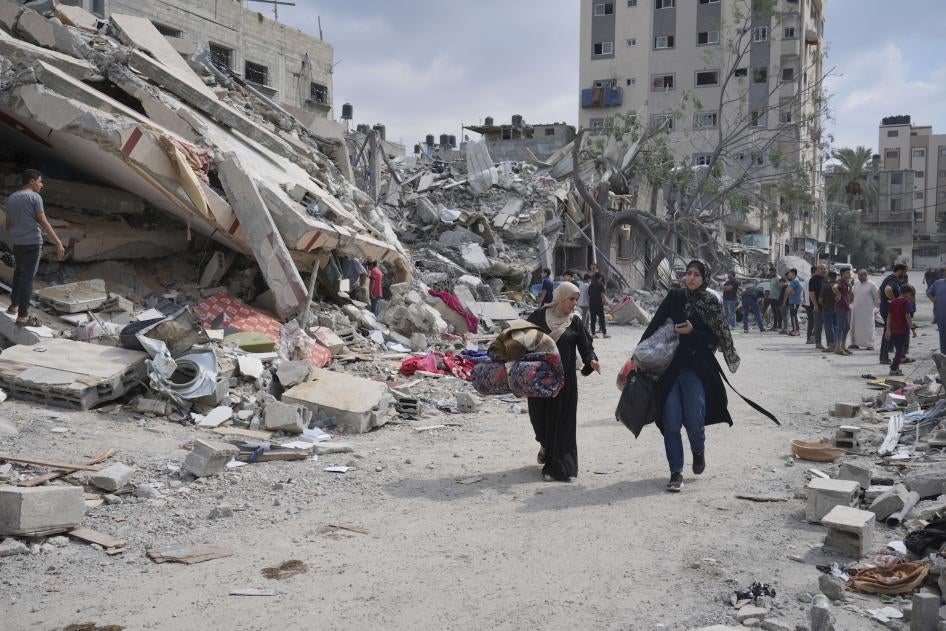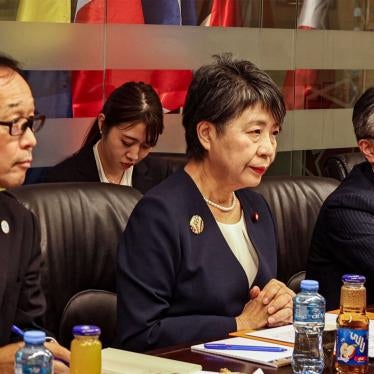“This is a moment of truth. History will judge us all.” This was the dire warning from the United Nations secretary-general on October 27 as he pleaded for concrete action to stop the killing and suffering unfolding in Israel and Palestine. Canada was instrumental in the creation of the current international framework for the prevention of large-scale and systematic crimes against civilians known collectively as mass atrocities. The Canadian government should now ensure that atrocity prevention is at the center of its response to the current Israel-Palestine crisis.
The risk factors for mass atrocities are evident with Israeli authorities and Palestinian armed groups signaling their disregard for civilian lives. The early warning signs are also clearly visible and include hateful and dehumanizing rhetoric; statements threatening harm to civilians; and serious violations of the laws of war that amount to war crimes.
For Palestinians trapped in Gaza, UN officials have described “unspeakable suffering” and “horror for one million children,” and warned that “people will start dying of severe dehydration” and that “without electricity, hospitals risk turning into morgues.” Against this alarming backdrop, the UN special rapporteur on the Occupied Palestinian Territories felt the need to remind countries of their “responsibility to prevent and protect populations from atrocity crimes.”
Canadians have historically been at the forefront of these efforts. In January 1994, General Roméo Dallaire, then commander of the UN peacekeeping force in Rwanda, sent a telegram to his superiors warning of a massive and coordinated slaughter of civilians. He repeatedly asked for a stronger mandate, more troops, and equipment to save lives, but his urgent requests and warnings were ignored. A genocide followed, which remains a stain on our collective conscience.
The international community’s utter failure to prevent mass atrocities in Rwanda and the Balkans led another Canadian, then UN Ambassador Allan Rock, to lead a successful effort in the late 1990s to secure the adoption of a set of principles to underscore the international community’s collective responsibility to protect civilians when governments are powerless or unwilling to stop the bloodshed. The Responsibility to Protect (R2P) doctrine, adopted unanimously by UN member states in 2005, aimed to reconcile state sovereignty with the moral and legal imperative to intervene to prevent mass atrocities.
Canada has also historically been a leading voice for international accountability. It played a central role in establishing the International Criminal Court (ICC) and has recently championed efforts to address grave crimes committed in Syria and Ukraine. But as experts have noted, preventing large-scale loss of civilian life requires three things: early warning, a preventive action toolbox, and political will. Unfortunately, political will to act is in very short supply in Canada.
The Canadian government has rightly denounced the heinous Hamas-led attacks against Israel, during which about 1,400 people were killed, including hundreds of civilians, according to the Israeli government. However, it has failed to condemn the Israeli government’s laws of war violations in Gaza. Instead, Canada reiterates that Israel should act “in accordance with international law,” though it’s clear that those norms are being ignored.
While the Canadian government has announced new humanitarian aid packages for Palestinians, it has not denounced Israeli authorities for willfully impeding life-saving relief supplies from entering Gaza, a war crime, as is the collective punishment of civilian populations for the actions of armed groups.
Despite Canada’s endorsement of a new political declaration on explosive weapons calling on states to restrict or refrain from their use in populated areas due to the high risk of harm to civilians, the Trudeau government has not condemned their repeated use in densely populated Gaza. The Canadian government has also remained silent on Israel’s current use of white phosphorus, incendiary material that burns human flesh and can cause lifelong suffering, in populated areas in Gaza and in Lebanon. More than 10,500 Palestinians, including more than 4,300 children, have been killed in Gaza since October 7, according to the Gaza Health Ministry.
Israeli authorities have a long track record of violating the laws of war and committing war crimes, as Human Rights Watch has documented during prior rounds of hostilities. But Canada’s irresolute position vis-à-vis Israel is not new. Prior to the current hostilities, the Trudeau government repeatedly turned a blind eye to Israeli authorities’ systematic repression and grave abuses of Palestinians, which Israeli, Palestinian, and international organizations have found amount to the ongoing crimes against humanity of apartheid and persecution. Despite the need for justice and accountability, Canada has shown no sign of revisiting its opposition to the ICC exercising any jurisdiction over serious crimes committed in the Occupied Palestinian Territory.
The Canadian government’s position departs from Canada’s storied legacy of action to prevent and address grave international crimes. But it’s not too late to reverse course. Prime Minister Trudeau can choose to act on these warning signs and not be a silent bystander to atrocities. His government can engage in an impartial and principled manner condemning not only the actions of Palestinian armed groups, but also those of the Israeli government.
The current crisis underscores the need for Canada to voice its support for accountability at the ICC. Canada should also unequivocally condemn violations of international humanitarian law, call on all those responsible to end abuses, and suspend military assistance and arms sales to Israel so long as its forces commit widespread, serious abuses against Palestinian civilians with impunity.
Ultimately, Canada can make clear that the lives of Palestinians and Israelis are equally valuable and that both are entitled to dignity, freedom, and protection from violence. The current situation is dangerous and untenable, and Canada should do all that it can to prevent mass atrocities.










